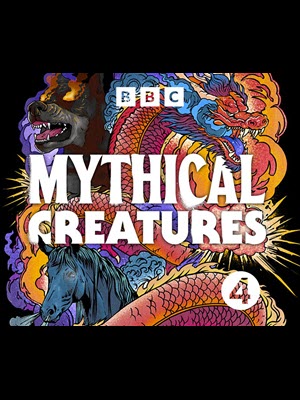Mythical Creatures
 As far as I’m aware, most of Rhianna Pratchett’s career so far has been in video games, which I dont play because I’m completely useless at them. In her position, I’d probably run as far away from the parental profession as possible. These days, however, she seems open about claiming the label of Fantasy Writer, and part of that has been to helm a series for BBC Radio 4 called Mythical Creatures.
As far as I’m aware, most of Rhianna Pratchett’s career so far has been in video games, which I dont play because I’m completely useless at them. In her position, I’d probably run as far away from the parental profession as possible. These days, however, she seems open about claiming the label of Fantasy Writer, and part of that has been to helm a series for BBC Radio 4 called Mythical Creatures.
This is a 10-episode set of programmes of around 15 minutes in length. They were broadcast on air over the past few weeks, but were also available on the BBC Sounds podcast feed. The basic format is that each episode focuses on a particular type of creature, and Pratchett investigates the stories around it.
Sadly there was much about the format that did not work for me. To start with, each episode contains some dramatisation of a story featuring the creature of the week. I’m really not good with audio dramas. That’s probably me, because other people seem to like them, but I do wish people would not feel the need to inject dramatic episodes into factual programmes.
In addition, most episodes contain some element of psychoanalysis. That is, having presented the creature of the week, Pratchett and her guest experts go on to pontificate on the ‘real’ meaning of the stories, and why people in past times felt the need to invent such silly tales. This strikes me as a very BBC thing to be doing. Traditionally the Corporation has hated fantasy, and would only allow it in material for children, or if some supposedly rational explanation could be found for the stories. I have my suspicions that the inclusion of such material was necessary in order to get the Beeb to buy the series. There does seem to be a movement away from it as the series goes on.
There are several episodes that I enjoyed despite my reservations. The dragon one, despite not mentioning Wales at all, is quite amusing because it details the efforts of the Lambton family to cash in on their ancestor’s famous adventure with the Lambton Wyrm. The episode that does centre on Wales is the one about giants. That’s because it features Idris the Thoughtful Giant, who is a lovely chap and not at all the horrible monster of Susan Cooper’s The Grey King. He just wants to sit there on his mountain and contemplate the mysteries of the universe.
I was particularly taken by the episode on selkies. Selkie stories are often tales of gender-based violence, in that a human male forces a selkie woman to become his wife by stealing and hiding her seal skin. While such stories may have had social functions in fishing communities of the past, they are now being re-purposed by people who specialise in supporting the victims of gender-based violence, which shows that fantasy tales have modern relevance, and can be re-imagined for different purposes.
The selkie episode is number 8 in the sequence. Pratchett returns to the theme of re-writing for the final episode which is all about the wulver.
The what? No, I hadn’t heard of it either. The wulver is Shetland’s Friendly Neighbourhood Wolfman. He specialises in helping people in trouble, usually by leaving them a nice fish so that they have something to eat. That’s not traditional behaviour by folkloric monsters, and it is perhaps no surprise to learn the at the wulver is not an ancient myth, but a 20th century invention.
The folklorist responsible for the invention of the wulver, Jessie Saxby, is often portrayed as a villain who invented what is termed ‘fakelore’. But, as Pratchett points out in the show, folklore is not a static thing that belongs to the past. Nor does a mythic creature have a single, fixed meaning. Stories evolve constantly. New creatures get invented. That’s how this all works. Maybe the wulver is just the sort of mythical creature that the world needs right now. (Along with the Hob, of course. Everyone who has to do housework wants one of them.)
Thus the series ends with a defence of the story-teller’s art. I don’t know whether the BBC executives who commissioned it will have been happy about that, but I know that I am.